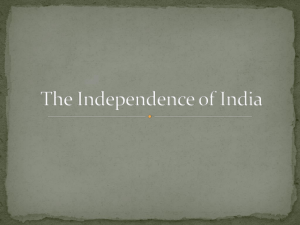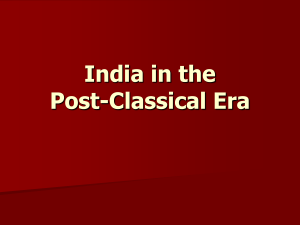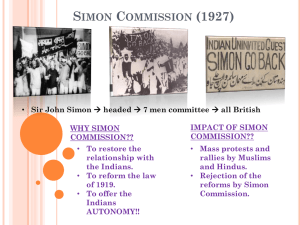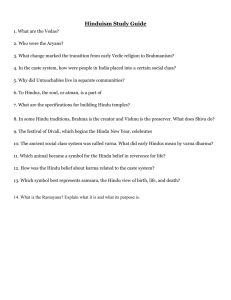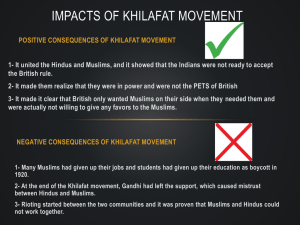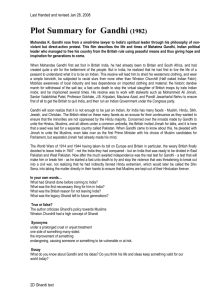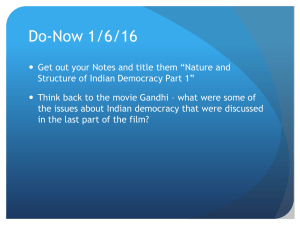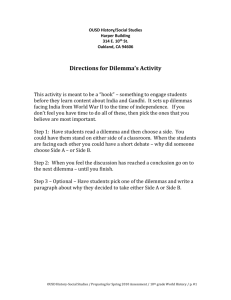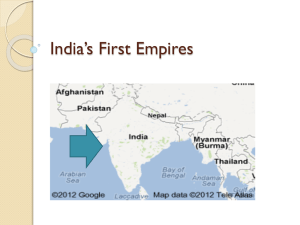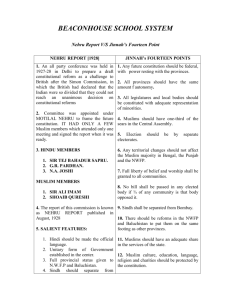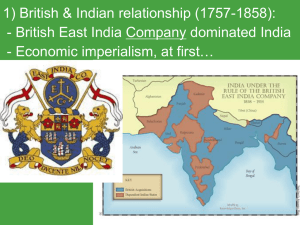book presentation
advertisement
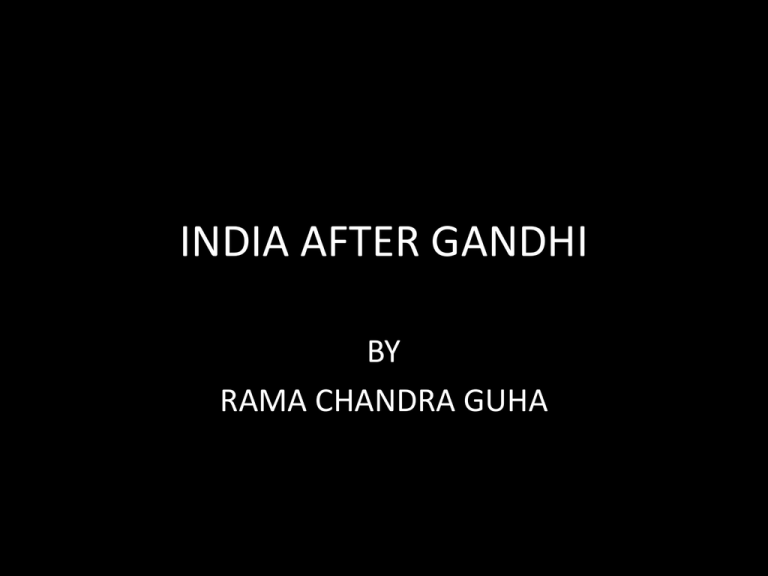
INDIA AFTER GANDHI BY RAMA CHANDRA GUHA TOPICS • • • • • Linguistic Reorganization of states Ideas of India RSS and Riots The logic of partition Indira Gandhi - Emergency Linguistic reorganization of states Nehru in 1937 wrote: Our great provincial languages are not dialects or vernaculars as the ignorant sometimes calls them. They are a rich inheritance, each spoken by many million persons each tied up inextricably with the life and culture and ideas of the masses as well as of the upper classes.... But by 1947 he was having second thoughts. The country had been divided on the basis of religion; would not dividing it further on the basis of lg merel The first and last need of India in the present moment is that it should be made a nation... Everything which helps the growth of nationalism has to go forward and everything which throws obstacles in its way has to be rejected... judged by this test, in our opinion [linguistic provinces] cannot be supported." - paras 146-147 of Report, 1948 183 Many MPs were dismayed at this report. Second committee formed with Nehru, PatePatel: set up the Linguistic Provinces Commission: l and Pattabhi Sitaramayya (JVP committee, after their initials). Also reported similarly: "Language is not only a binding force but also a separating one.... Every separatist and disruptive tendency should be rigorously discouraged." Ideas of india The Constituent Assembly had more than 300 members. In his magisterial history of the Indian Constitution, Granville Austin identifies twenty as being the most influential. Of these, as many as twelve had law degrees, including the Congress stalwarts Jawaharlal Nehru, Vallabhbhai Patel and Rajendra Prasad. Outside this Congress trinity the most crucial member of the Assembly was the brilliant low-caste lawyer B. R. Ambedkar. Ambedkar was law minister in the Union government; and also chairman of the Drafting Committee of the Indian Constitution. Serving with him were two other formidable minds: K. M. Munshi, a Gujarati polymath who was a novelist and lawyer as well as freedom fighter, and Alladi Krishnaswami Aiyar, a Tamil who for fifteen years had served as advocate general to the Madras presidency. RSS and RIOTS Golwalkar was strongly opposed to the idea of a secular state that would not discriminate on the basis of religion. His conceptions were: The non-hindu people of hindustan must either adopt hindu culture and language, must learn and respect and hold in reverence the hindu religion, must entertain no idea but of those of glorification of the hindu race and culture... in a word they must cease to be foreigners, or may stay in the country, wholly subordinated to the hindu nation, claiming nothing, deserving no privileges, far less any preferential treatment -- not even citizens’ rights. [ "We, or our nation defined", 1947, p.55-6; quoted p.19] The logic of division It was India’s historic destiny that many human races and cultures should flow to her, finding a home in her hospitable soil, and that many a caravan should find rest here . . . Eleven hundred years of common history [of Islam and Hinduism] have enriched India with our common achievements. Our languages, our poetry, our literature, our culture, our art, our dress, our manners and customs, the innumerable happenings of our daily life, everything bears the stamp of our joint endeavour . . . These thousand years of our joint life have moulded us into a common nationality . . . Whether we like it or not, we have now become an Indian nation, united and indivisible. No fantasy or artificial scheming to separate and divide can break this unity. MAULANA ABUL KALAM AZAD The problem in India is not of an intercommunal but manifestly of an international character, and must be treated as such . . . It is a dream that Hindus and Muslims can evolve a common nationality, and this misconception of one Indian nation has gone far beyond the limits, and is the cause of most of our troubles, and will lead India to destruction, if we fail to revise our actionsin time The Hindus and Muslims belong to two different religious philosophies, social customs, and literature. They neither intermarry, nor interdine together, and indeed they belong to two different civilizations which are based mainly on conflicting ideas and conceptions. Their aspects on and of life are different. M. A. JINNAH, Muslim League Presidential Address, 1940 • The reasons for division were mainly: • the Congress leadership for underestimating Jinnah and the muslims • Jinnah for pursuing his goal of a separate country regardless of human consequences • the British responsible, claiming that they promoted a divide between Hindus and Muslims to perpetuate their rule Indira Gandhi-Emergency Indira: Democracy 'not only throws up the mediocre person but gives strength to the most vocal howsoever they may lack knowledge or understanding'. (letter) 499 The congress has become moribund. Sometimes I feel that even the parliamentary system has become moribund. ... the 'inertia of our civil service is incredible... we have a system of dead wood replacing dead wood.... Sometimes I wish we had had a real revolution - like France or Russia - at the time of independence. (to journalist) with opposition MPs locked away, the 38th amendment (22 Jul 75) barred judicial review of the emergency. The 39th amendment, introduced two weeks later, stated that the election of the PM could not be challenged by the Supreme Court, but only by a body constituted by Parliament. This came just before the Court was to try her election review petition, and the Court held there was now "no Case to try". Supreme Court it held that detentions without trial were legal under the new dispensation. Of the five-member bench only one dissented: this was Justice H. R. Khanna, who pointed out that ‘detention without trial is an anathema to all those who love personal liberty’. It was suggested that the judgement was influenced by extralegal considerations – by the hope of three of the judges that they might one day become chief justice, by the fear inspired by the punitive transfers of officials that had commenced with the emergency. In a despairing editorial entitledFading Hopes in India’, the New York Times remarked that ‘the submission of an independent judiciary to an absolutist government is virtually the last step in the destruction of a democratic society THANK YOU
